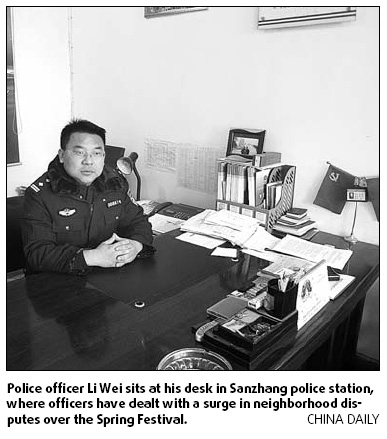Society
Police denied Spring Festival break
By Wang Wen (China Daily)
Updated: 2010-02-23 07:36
 |
Large Medium Small |
WEINAN, Shaanxi: Several packets of instant noodles are piled up on officer Li Wei's desk at the city's Sanzhang police station. A neatly-folded silk banner, which the local telecom company gave his staff as a token of thanks for their service, lies on a vacant chair in one corner.
Li didn't even have time to hang up the banner during the Spring Festival, an exceptionally busy time for police in Weinan, a major exporter of labor in the country, with almost half a million migrant workers returning home to spend the holidays with their families.

All six police officers at the Sanzhang police station have been on their toes since the beginning of the lunar New Year.
The police station is in charge of two towns, where some 60,000 people live in 36 villages.
Li, 38, said that "one in every four villagers" works away from the city and almost all of them return home during the Chinese New Year holiday. Many of them aim to settle domestic disputes during the holiday.
"We receive an alarm almost every day during the festival. I have to be on duty," Li said.
The police station received more than 400 alarms last year, about 300 of which were cries for help.
"People are becoming too dependent on the police. For every small thing, they call us first," he said.
A peasant couple, who did not wish to be named, spent the fifth day (Feb 18) of the New Year at the Sanzhang police station trying to settle a year-long dispute with their neighbor.
It was the sixth such case the police station had received this festival season.
In early 2009, the couple mistakenly left a wheelbarrow near the house of their neighbor, who got angry and told her son to fight with the next-door residents. The couple were injured in the brawl and want compensation.
"Our neighbor's son, who brawled with us, returns only during the Spring Festival, which is why we're here to ask the police for help," the man said. "We want nothing less than 4,000 yuan ($586) in compensation."
Officer Li said they had been trying for two days to get both parties to reach an agreement but their efforts have proven futile.
"Neither of the two sides is ready to budge," he said, adding it is common for such trivial matters to drag on for a long time.
"But it is our job to continue trying," he said.
Li said he would want his fellow officers to enjoy the festival at home with their families but it is not possible.
"If they leave the police station, some cases will not be solved in time," said Li, who has been working at the police station since 2006 and has spent every Spring Festival since then on duty.
Gao Lei, one of three newly-recruited officers, lives in the police station during the festival season, even though his house is just 10 km away.
Gao, who was posted to the Sanzhang police station in March last year, was on duty from noon on Feb 16 to 8 am on Feb 20.
"I have just started to understand the painful life a policeman has to live," 27-year-old Gao said.
"Before I joined the force, all I could think about was how majestic police officers look in their uniforms and all I could dream about was wearing one," said Gao, who graduated from Weinan Teachers College in 2008.
Gao was set to become a teacher when he had a change of heart and sat for the police recruitment examination after graduation.
He said the biggest challenge he faced after becoming a police officer was to let go of the teacher inside him.
"Initially, I tried to use a teacher's attitude to mediate disputes in villages but it did not work because most of the villagers are much older and refuse to be educated by a youngster," Gao said.
It took several months for him to understand how to communicate with rural residents: by guiding them emotionally and also educating them about the law.
"The most important work in the countryside is making residents aware of the law," he said, adding it is "only due to lack of knowledge" that police waste so much time settling petty disputes.







